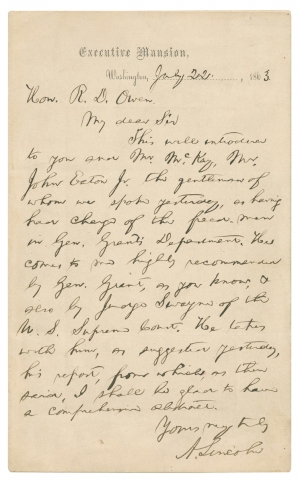|
Abraham Lincoln Introduces Ulysses S. Grant’s Superintendent of Freed Slaves to the American Freedmen’s Inquiry Commission |
Click to enlarge:

“Mr John Eaton Jr. … having had charge of the freed-men … comes to me highly recommended by Gen. Grant, as you know, & also by Judge Swayne[1]of the U. S. Supreme Court.
On July 22, 1862, exactly a year before he wrote this letter, Lincoln read a draft of the Emancipation Proclamation to his cabinet, agreeing to Stanton’s advice to hold it back until the Union could claim a military victory. On September 22, after the Battle of Antietam, he issued a Preliminary Proclamation, stating that enslaved people in any areas still in rebellion would be freed, and that freed men would be welcomed into the armed forces of the United States. Once Lincoln issued the final Emancipation Proclamation on January 1, 1863, Secretary of War Edward Stanton worked to create a federal system to support freed slaves, and allow them to most effectively support the Union.
Abraham Lincoln.
Autograph Letter Signed as President, to Robert Dale Owen, July 22, 1863, Washington, D.C. On Executive Mansion stationery. 1 p., 5 x 8 in.
Inventory #26470
Price: $75,000
John Eaton Jr. had been commissioned colonel of the 63rd U.S. Colored Infantry in August 1862. A month later, General Ulysses S. Grant appointed him as Superintendent of Negro Affairs for the Department of the Tennessee. Eaton supervised the creation of seventy-four schools for African Americans, sought to establish a fair system of paid labor, and arrange for freed slaves who were willing to effectively provide labor and support to the army.
Sent by Grant to Washington, D.C., Eaton first met Lincoln on July 21, 1863. That night, Lincoln read the report Eaton compiled on freedmen in the Department of Tennessee. They met again the next day, and Lincoln gave Eaton this letter to the Freedmen’s Inquiry Commission, then in New York. Eaton began working with the Commission while continuing his hands-on work in Grant’s department. Eaton met with Lincoln several more times, and was entrusted with a very sensitive political mission relating to Grant and the election of 1864.
After the war, Eaton was Tennessee’s superintendent of schools from 1867 to 1869. President Grant appointed him in 1870 as the second U.S. Commissioner of Education. By 1886, Eaton organized Washington, D.C.’s Board of Education, implemented a national education plan, and reorganized the Bureau of Refugees, Freedmen, and Abandoned Lands. He then served as president of Marietta College in Ohio, Sheldon Jackson College in Sitka, Alaska, and Westminster College in Salt Lake City, Utah, as well as inspector of education in Puerto Rico, and Councilor of the American Public Health Association and president of the National Congress of Education and of the American Society of Religious Education.
Complete Transcript
Executive Mansion,
Washington, July 22, 1863.
Hon. R. D. Owen.
My dear Sir
This will introduce to you and Mr McKay, Mr John Eaton Jr. the gentleman of whom we spoke yesterday, as having had charge of the freed-men in Gen. Grant’s Department. He comes to me highly recommended by Gen. Grant, as you know, & also by Judge Swayne[1]of the U. S. Supreme Court. He takes with him, as suggested yesterday, his report, from which, as then said, I shall be glad to have a comprehensive abstract.
Yours very truly
A. Lincoln
The addressee, Robert Date Owen, and James M. McKaye were both strong supporters of aid to, justice for, and education of freed slaves. Their final Commission report, with Eaton’s input, called for the government to aid the freedmen until the law could secure to them “their just rights of person and property; relieve them, by a fair and equal administration of justice, from the depressing influence of disgraceful prejudice; above all, guard them against the virtual restoration of slavery in any form, under any pretext, and then let them take care of themselves.” Unfortunately, plans for such constructive reconstruction did not long survive the president.
A more detailed description is available on request.
[1]Noah Haynes Swayne (1804-1884), appointed to the Supreme Court by Abraham Lincoln in January 1862, became the first Republican justice, serving until 1881.